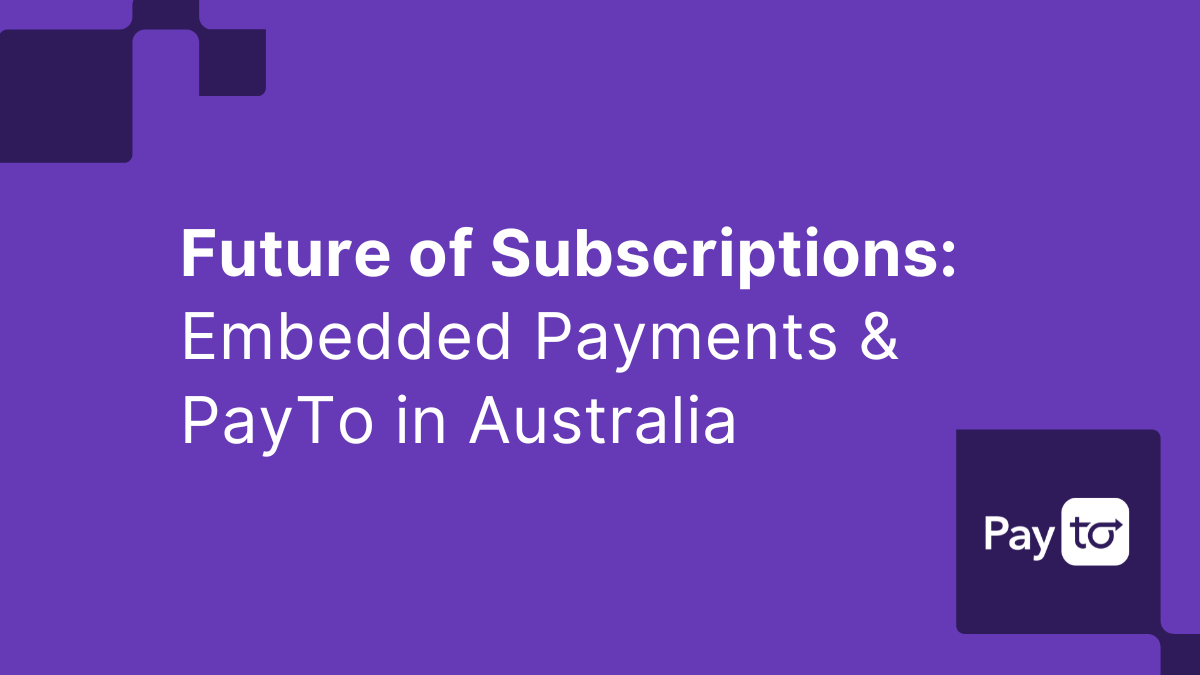MPS and PayTo
Updated as of October 2024: The Mandated Payments Service (MPS) is now known as PayTo. PayTo is a real-time payment solution that can be used for one-off, ad-hoc and recurring billing.
What is MPS?
Customers can authorise third parties to initiate real-time payments from their bank accounts via the NPP.
MPS is to be combined with consistent customer authorisation and third party payment initiation via the NPP.
Third parties who wish to initiate instant payments from a customer’s account can submit payment initiation messages easily through the NPP. These third parties can then reach all NPP enabled accounts; they do not require additional arrangements with multiple financial institutions. This ease of access, helps both businesses and customers, anywhere and anytime.
The MPS is flexible and supports many different payment initiation scenarios (NPPA, 2020);
• Scheduled, recurring payments
• Subscription services
• Service providers e.g. payroll accounting
• Event or trigger based e.g. e-invoicing or smart contracts
• Ecommerce payments
• In-app payments
• In-store payments
• One-off payments
Key features and business benefits
Authorised third parties will use MPS to initiate payments have access to a range of features (NPPA, 2020);
• Real-time validation of the customer’s account at the time of mandate creation
• Real-time funds availability check (at time of payment)
• Real-time confirmation of payment
• Real-time response on payment instructions
• Receive notifications of changes to mandate status. E.g. if the mandate is cancelled or suspended
• Centralised storage of mandate records
• Data-rich capabilitity with more data included in the payment message.
• Ability to support more seamless, digitiesed and efficient processes.
Payments initiated via real-time are faster and more data rich than batch payments. Real-time payments have real-time confirmation of funds availability and confirmation of payment.
This enables third parties to deliver services immediately. For example dispatching goods in an ecommerce scenario or delivering services subject to an ongoing subscription can now be infinitely faster.
Customer benefits
The MPS creates a more digital and enhanced customer payments experience.
Customers can digitally authorise/view/modify/manage the mandates they have given for third parties. These third parties then initiate payments from their bank account. Customers can easily move their mandate payment arrangements from one bank account to another account at a different financial institution.
Customers have increased visibility and control over their various payment arrangements and madate payment arrangements linked to their account.
Customers have more control over their account and can more easily perform mandate maintenance functions, e.g. cancel a mandate.
Customers can also use PayID when setting up mandte arrangements on their account rather than using their BSB and account number. Customers can also easily move mandate payment arrangements linked to their account to an account held at another bank.
MPS also provides a more digital, user-friendly customer experience. Banks can also choose to optionally deliver additional notifications to customers regarding their upcoming payments.
How does the MPS work?
The MPS consists of:
- Payment initiation message capability. This is used by third parties to request payments from a customer’s bank account. Those payment requests are associated with a customer authorised payment arrangement, a ‘mandate’
- A centralised database for creating, storing and maintaining mandate records (the Mandate Management Service). This is owned and operated by NPP Australia.
- Associated business rules. These provide assurance that the payment initiation messages will be acted upon by the customer’s financial institution.
Customer authorisation
Third party payment initiation is supported in a safe and secure manner using the MPS. The customer provides explicit authorisation for payments to be processed from their bank account.
This authorisation is captured in the creation of a digital payment arrangement or a ‘mandate’. This mandate serves as a record of the customer’s authorisation (or consent) for payments. Payments will then be initiated from their account by a specified third party, in advance of any payments being processed.
A customer’s explicit authorisation is required for any payments to be initiated on their account by a third party. Performing authorisation within a customer’s banking channel benefits from the bank’s secure authentication practices.
A record of the customer’s authorisation (a ‘mandate’) is created and stored centrally. This is stored with both the customer’s bank and the payment initiator’s bank. Both can retrieve and view the mandate record.
The agreed payment terms are included in the mandate record, such as:
• the name of the customer
• their bank account details
• payment initiator details
• creditor details (optional) and
• the frequency and amount of the payments that the customer has pre-authorised
With the MPS, businesses and customers can easily make payments in real-time alongside real-time reporting and automatic reconciliation. Making payments has never been easier.


.png)


